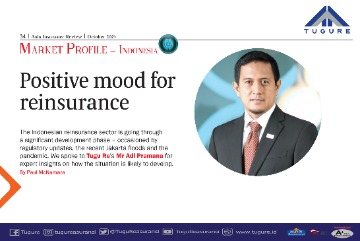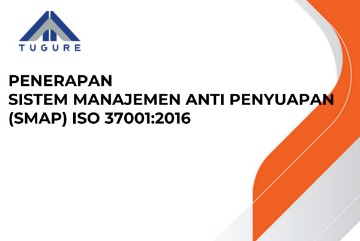- Home
- News & Media
- Detail
Asia Insurance Review - October 2021
The Indonesian reinsurance sector is going through a significant development phase – occasioned by regulatory updates, the recent Jakarta floods and the pandemic. We spoke to Tugu Re’s Mr Adi Pramana for expert insights on how the situation is likely to develop.
Watchers of Indonesian reinsurance have been kept busy in the recent past with Reasuransi Nasional Indonesia (Nasional Re) being subsumed by the state-owned insurance and underwriting entity Indonesia Financial Group. But none of this changed Tugu Reasuransi Indonesia’s (Tugu Re) vision of becoming the leading reinsurance company in Indonesia with a regional capability. Tugu Re is owned by Tugu Pratama Interindo (50.74%) and Asriland (49.26%).
Time for reflection
We caught up with Tugu Re president director Adi Pramana to find out about significant developments in the past year that affected the reinsurer. “Last year we had the pandemic and business slowed down with our income reducing a little,” said Mr Pramana. “Last year we also had some significant claims from the Jakarta floods in January and February. We also had some serious health insurance claims, especially relating to COVID-19. “That’s the perfect time for underwriters to reflect on their portfolio - portfolio management and their underwriting policy - and that’s what we did,” said Mr Pramana. “We had reviewed our underwriting policies in 2019 so that was the second time that we had reviewed them and we took the opportunity to rebalance the portfolio. “We have also become more mature in dealing with risk this year and we expect risk will continue to change. From last year we learnt that we need to expect future risks to be different,” he said. The year ahead is likely to be equally uncertain, but Mr Pramana remains unperturbed. “With the pandemic, there will be some variations, but we expect the pandemic to continue,” said Mr Pramana. “In terms of premium growth, last year was impacted very significantly compared to the previous year. But this year, while business is still slowing down, the curve is flattening. “If this year is the bottom of the curve, next year will be fantastic because growth will be much stronger simply based on the nominal numbers. There could still be variations in the how we deal with the pandemic. We’re still in a positive mood for next year although we have to be cautious about what might happen.”
Nat CAT and cyber
Longer-term development of Nat CAT cover in Indonesia has simply become part of doing business for insurers and reinsurers. “Climate change will affect the whole of the region, but I think we are still in a very good shape in Indonesia,” said Mr Pramana. “We are already reducing our Nat CAT exposures.” Cyber, on the other hand, could be different proposition. “It’s still in ‘very slow mode’ up to now,” said Mr Pramana. “The first part of cyber lies in rectifying losses and I think we can develop that further and talk more about the potential in Indonesia. If we are talking about business interruption, for example, that’s something that we would like to explore more. “Looking to the future, Indonesia is one of the most prolific in terms of digital platforms and we are experiencing significant growth in that area. Awareness will continue to increase and that’s something that we would like to exploit. There will have to be forensic IT engineers and databases developed to help calculate losses in the future.” Mr Pramana seems sanguine. “Cyber cover will increase, but I’m not sure it will increase significantly. Perhaps in two or three years we will see a jump in terms of coverage,” he said.
Strength of domestic reinsurance
The dynamic between domestic and foreign reinsurers in Indonesia is another area that receives a lot of attention. “Within the ASEAN free trade area, we will be much more open to our neighbours,” said Mr Pramana. “But in reality, you also have to adjust for current account deficits, especially because of the pandemic. Every country will need to utilise what they have first and then speak to other countries. Finding the perfect balance is quite difficult and this is what the government is trying to do. “In the longer term, I’m quite sure there will be significant change in the dynamic between domestic and foreign reinsurers, but in the shorter term I’m not forecasting there will be significant change,” he said. “In Indonesia we will be applying IFRS17 in 2025 so probably after that, yes, we will see some change because everybody can see everybody else’s books, but not before 2025. If foreign entities want to enter the Indonesian market, they would probably be better off taking equity in a (re)insurance company,” said Mr Pramana.

Secara garis besar, asuransi adalah pertanggungan atau perjanjian antara dua belah pihak... Read More

Salam Tugurean ....
Artikel bulan ini membahas mengenai Management Penyimpanan Gudang, untuk menghindari da... Read More

Salam Tugurean ....
Artikel bulan ini membahas mengenai Management Mengurangi Resiko pada Pabrik Plastik, Read More

Salam Tugurean ....
Artikel bulan ini membahas mengenai penyebab terjadinya kebakaran hutan dan seperti apa... Read More
Salam Tugure ....
Artikel bulan ini membahas mengenai Dampak Banjir dan Bagaimana Mencegah dan Menangg... Read More
Salam Tugure, kami hadir untuk memberikan informasi kepada anda. Maraknya pencurian masih menjadi teror bagi kita sem... Read More
Salam Tugure, kami hadir untuk memberikan informasi kepada anda. Maraknya bencana alam di indonesia, diawal tahun 202... Read More
Informasi Tugure Perihal WFH - Work From Home
... Read MoreInformasi Tugure Perihal HUT Ke 33 PT Tugu Reasuransi Indonesia.
... Read More
Salam Tugure, kami hadir untuk memberikan informasi kepada anda. Dalam Pandemi Covid-19 ini bagaimana cara survei ris... Read More
Information The Correspondence and Administrative
... Read MoreTugure Torehkan Peningkatan Hasil Usaha
... Read More
TUGURE Sharing Knowledge Edisi Sekarang Membahas Mengenai, Jarak Bangunan Kita Terhadap Potensi Kebakaran.
... Read More
Asia Insurance Review - October 2021
The Indonesian reinsurance sector is going through a sign... Read More


Health is the most important part that must be maintained. In addition to maintaining a healthy lifestyle, you should... Read More

Protecting private vehicles with vehicle insurance has become a basic need for some people. How not, the risk of driv... Read More

Education Insurance is a well-known insurance product with very useful benefits for your child's future. Educatio... Read More

Home insurance is insurance that provides protection against losses resulting from fire, theft, or damage caused by n... Read More

Holiday moments with friends, spouse or family are the most enjoyable moments. But, don't let that moment be disr... Read More

Have you ever heard of the term Reinsurance? Reinsurance is a term used by a company/business entity to protect it ag... Read More

The target o... Read More

Interested i... Read More

Not only doe... Read More

Before deciding to choose the type of insurance is to understand the terms in the insurance policy. One term that is ... Read More

Having a vehicle such as a car should be able to protect it with insurance. Car Insurance itself provides protection ... Read More

Performing t... Read More

Choosing an ... Read More

Entering pro... Read More

Even though they have similar benefits, Life Insurance and Health Insurance still have differences too. Like what? Read More

The solution to releasing fatigue by taking a vacation or traveling to a new place is the most powerful weapon for re... Read More

Although retirement is still relatively long. However, it should still be prepared as early as possible. Why?
... Read More
Home is a most valuable asset. To get it we have to work hard and save a lot of time.
Like a very valuable ... Read More

Purchasing car insurance requires careful consideration. Should you choose Total Loss Only (TLO) insurance or compreh... Read More

Who doesn't love to travel? Going on a trip is a great way to relieve stress and take a break from our daily acti... Read More

Just like other insurance products, choosing home insurance requires careful consideration.
Currently, ther... Read More

Life insurance provides financial protection against unexpected risks such as death, accidents, critical illness, and... Read More

Choosing an insurance company can be challenging. With so many companies claiming to be the best, it's important ... Read More

The term "reinsurance" is not commonly heard by the general public. This term is used when an insurance com... Read More

Being a career woman comes with double responsibilities. However, it is not surprising, especially in big cities, to ... Read More

Enjoying your retirement requires preparation starting from your productive years. The only thing you can rely on dur... Read More

Choosing an insurance product is not something to be taken lightly, especially for women. It requires careful conside... Read More

In order to meet the expenses of your child's education, it is important to prepare for it as best as possible, e... Read More

Unit Link insurance has become popular in Indonesia, with claimed benefits that can be highly advantageous for consum... Read More

To All Business Partners of PT Tugu Reasuransi Indonesia, we kindly request your assistance in improving our service ... Read More
Innalilahi wainalilahi rojiun
It is with deep sorrow that we announce the passing of
Mr. Usmanshah

Dear Tugure Business Partners,
We would like to inform you that the official email domain of PT Tugu Reasur... Read More